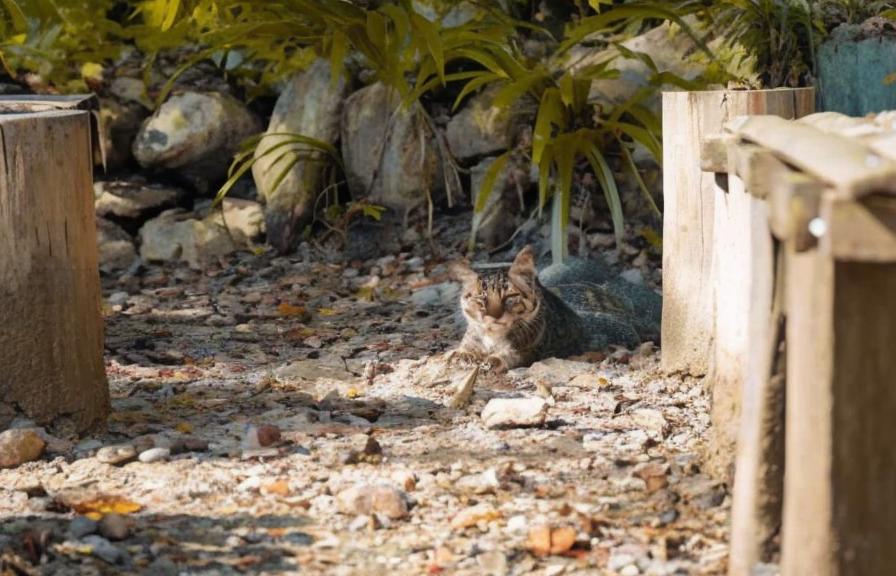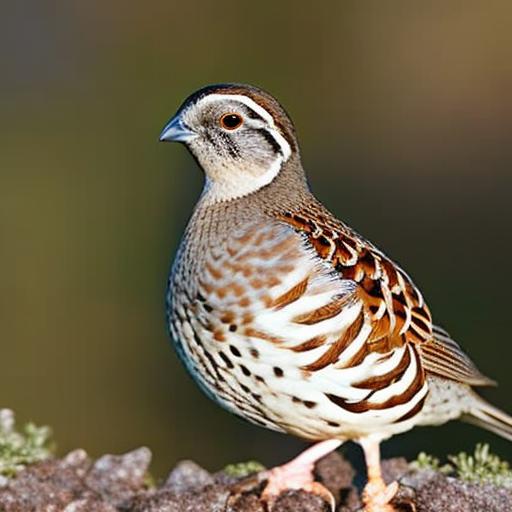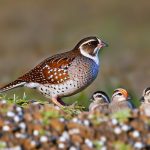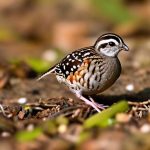Quails are small, ground-dwelling birds that are often kept as pets due to their charming and endearing nature. They are known for their gentle disposition and low maintenance, making them an ideal choice for those looking for a feathered friend. Quails come in various species, with the most common ones being the Japanese quail, the Coturnix quail, and the Bobwhite quail. These birds are known for their beautiful plumage and distinctive calls, making them a delightful addition to any household. While quails are often kept for their eggs and meat, they also make wonderful pets due to their social nature and entertaining behaviors. In this article, we will explore the considerations for keeping a single quail as a pet, including their social and behavioral needs, housing and space requirements, diet and nutrition, as well as health and veterinary care.
Key Takeaways
- Quail make unique and low-maintenance pets, suitable for those with limited space and time.
- Keeping a single quail requires careful consideration of their social and emotional needs.
- Quail are social birds and thrive in the company of their own kind, so providing companionship is important.
- Adequate housing and space are essential for the well-being of a single quail, with a minimum of 1 square foot of space per bird.
- A balanced diet of seeds, grains, and insects is crucial for the health and longevity of a single quail.
Considerations for Keeping a Single Quail
When considering keeping a single quail as a pet, it’s important to understand that these birds are highly social creatures and thrive in the company of their own kind. However, if you are unable to keep multiple quails due to space constraints or other reasons, it is possible to keep a single quail with proper care and attention. It’s important to provide the quail with plenty of mental stimulation and interaction to prevent loneliness and boredom. This can be achieved through regular handling, providing toys and enrichment activities, and ensuring that the quail has a stimulating environment to explore. Additionally, it’s crucial to consider the lifespan of a quail, as they can live up to 3-5 years in captivity. Therefore, it’s important to be prepared for the long-term commitment of caring for a quail and providing for its needs throughout its life.
On the other hand, it’s important to note that quails are flock animals by nature, and they thrive in the company of their own kind. Keeping a single quail may lead to loneliness and stress for the bird, which can have negative effects on its overall well-being. If possible, it is recommended to keep at least two quails together to provide companionship and social interaction. However, if keeping a single quail is the only option, it’s crucial to dedicate extra time and effort to ensure that the bird receives adequate attention and companionship from its human caretaker. Additionally, it’s important to consider the legal regulations and restrictions regarding keeping quails as pets in your area, as some regions may have specific requirements or limitations for keeping these birds.
Social and Behavioral Needs of Quail
Quails are highly social birds that thrive in the company of their own kind. In the wild, they form tight-knit flocks and rely on social interactions for their well-being. When kept as pets, it’s important to provide quails with opportunities for socialization and interaction to ensure their mental and emotional health. If keeping a single quail, it’s crucial to spend quality time with the bird on a daily basis to provide companionship and prevent loneliness. This can be achieved through gentle handling, talking to the quail, and providing opportunities for the bird to explore its surroundings.
Quails are also known for their curious and active nature, and they require plenty of mental stimulation to prevent boredom. Providing toys, perches, and enrichment activities can help keep the quail entertained and engaged. Additionally, quails are ground-dwelling birds that enjoy scratching and dust bathing, so providing a suitable substrate for these behaviors is essential for their well-being. Overall, understanding the social and behavioral needs of quails is crucial for providing them with a fulfilling and enriching environment in captivity.
On the other hand, it’s important to note that quails can be skittish and easily stressed, especially when kept in unfamiliar or stressful environments. Therefore, it’s important to provide a calm and secure living space for the quail, away from loud noises or sudden movements that may startle the bird. Additionally, providing hiding spots and sheltered areas within the enclosure can help the quail feel safe and secure. Understanding the natural behaviors and instincts of quails is essential for creating a suitable environment that meets their social and behavioral needs.
Housing and Space Requirements for Quail
When keeping a single quail as a pet, it’s important to provide adequate housing and space to ensure the bird’s comfort and well-being. Quails require a secure enclosure that protects them from predators and provides ample space for exercise and exploration. The enclosure should be spacious enough to allow the quail to move around freely and engage in natural behaviors such as scratching, dust bathing, and perching. Additionally, the enclosure should be equipped with suitable bedding material that allows for natural behaviors while maintaining cleanliness.
It’s important to provide a suitable shelter within the enclosure where the quail can rest, seek refuge, and feel secure. This can be achieved through the use of shelters or hiding spots that provide privacy and protection for the bird. Additionally, the enclosure should be equipped with perches or platforms that allow the quail to roost and perch off the ground. Providing a variety of environmental enrichment such as branches, rocks, or logs can also help create a stimulating environment for the quail.
On the other hand, it’s important to ensure that the enclosure is escape-proof and provides adequate ventilation to maintain air quality within the space. Regular cleaning and maintenance of the enclosure are essential for preventing the buildup of waste and maintaining a hygienic living environment for the quail. Overall, understanding the housing and space requirements for quails is crucial for providing them with a safe, comfortable, and enriching living space.
Diet and Nutrition for a Single Quail
Proper diet and nutrition are essential for maintaining the health and well-being of a single quail kept as a pet. Quails are omnivorous birds that require a balanced diet consisting of high-quality commercial feed, fresh fruits and vegetables, seeds, insects, and grit. It’s important to provide a commercial game bird feed that is specifically formulated for quails to ensure that they receive essential nutrients such as protein, vitamins, and minerals. Additionally, offering fresh fruits and vegetables such as leafy greens, carrots, and berries can provide additional vitamins and fiber to their diet.
In addition to commercial feed and fresh produce, quails also benefit from access to seeds such as millet or sunflower seeds as well as live insects such as mealworms or crickets. These foods provide essential protein and nutrients that contribute to the overall health of the quail. It’s important to offer a varied diet to ensure that the quail receives all the necessary nutrients for optimal health.
On the other hand, it’s important to provide access to grit or small stones within the enclosure to aid in digestion. Grit helps grind down food in the gizzard, allowing for better absorption of nutrients from their diet. Additionally, providing access to clean water at all times is crucial for maintaining hydration and overall health. Understanding the dietary needs of quails is essential for providing them with a balanced and nutritious diet that supports their health and well-being.
Health and Veterinary Care for Quail

Maintaining the health of a single quail kept as a pet requires regular monitoring, proper care, and access to veterinary services when needed. It’s important to observe the quail daily for any signs of illness or injury such as changes in behavior, decreased appetite, abnormal droppings, or respiratory issues. Any concerning symptoms should be promptly addressed by seeking veterinary care from an avian veterinarian with experience in treating quails.
Additionally, providing regular access to clean water, a balanced diet, proper housing conditions, and environmental enrichment can help prevent common health issues in quails such as nutritional deficiencies or respiratory infections. Maintaining good hygiene within the enclosure through regular cleaning and disinfection can also help prevent the spread of diseases.
On the other hand, it’s important to be prepared for potential health issues that may arise in pet quails such as egg binding in females or injuries from accidental falls or predator attacks. Having a basic understanding of first aid for birds can be beneficial in providing immediate care while seeking veterinary assistance. Overall, understanding the health needs of pet quails is essential for providing them with proper care and ensuring their well-being.
Is Keeping a Single Quail as a Pet Right for You?
In conclusion, keeping a single quail as a pet requires careful consideration of their social, behavioral, housing, dietary, and health needs. While quails are highly social birds that thrive in the company of their own kind, it is possible to keep a single quail with proper care and attention. However, it’s important to dedicate extra time and effort to ensure that the bird receives adequate companionship and mental stimulation when kept alone.
Understanding the natural behaviors and instincts of quails is crucial for creating a suitable environment that meets their social and behavioral needs. Providing adequate housing with ample space for exercise and exploration is essential for ensuring the comfort and well-being of pet quails. Additionally, offering a balanced diet consisting of commercial feed, fresh produce, seeds, insects, grit, and clean water is crucial for maintaining their health.
Lastly, maintaining good hygiene within the enclosure and providing access to veterinary care when needed are essential for preventing common health issues in pet quails. Ultimately, keeping a single quail as a pet can be a rewarding experience for those who are willing to provide proper care and attention to meet their needs.
If you’re considering keeping just one quail as a pet, it’s important to understand their needs and behaviors. Quails are social birds, so it’s recommended to keep them in pairs or small groups. However, if you’re set on having just one quail, it’s crucial to provide plenty of interaction and enrichment to prevent loneliness and stress. For more information on the dietary needs of poultry, including quails, check out this insightful article on what to feed ducks. Understanding the nutritional requirements of different poultry species can help ensure the health and well-being of your feathered friends.
FAQs
What are the basic needs of a pet quail?
Quails require a suitable living space, proper nutrition, access to clean water, and regular social interaction.
Can quails be kept as solitary pets?
Quails are social birds and thrive in the company of other quails. Keeping just one quail as a pet may lead to loneliness and stress for the bird.
What type of living space do quails need?
Quails need a spacious and secure enclosure with access to both indoor and outdoor areas. The enclosure should provide protection from predators and the elements.
What do quails eat?
Quails require a balanced diet of commercial quail feed, supplemented with fresh fruits, vegetables, and occasional treats like mealworms.
Are there any legal restrictions on keeping quails as pets?
It is important to check local regulations and zoning laws before keeping quails as pets, as some areas may have restrictions on keeping poultry or require permits for keeping quails.
Meet Walter, the feathered-friend fanatic of Florida! Nestled in the sunshine state, Walter struts through life with his feathered companions, clucking his way to happiness. With a coop that’s fancier than a five-star hotel, he’s the Don Juan of the chicken world. When he’s not teaching his hens to do the cha-cha, you’ll find him in a heated debate with his prized rooster, Sir Clucks-a-Lot. Walter’s poultry passion is no yolk; he’s the sunny-side-up guy you never knew you needed in your flock of friends!







